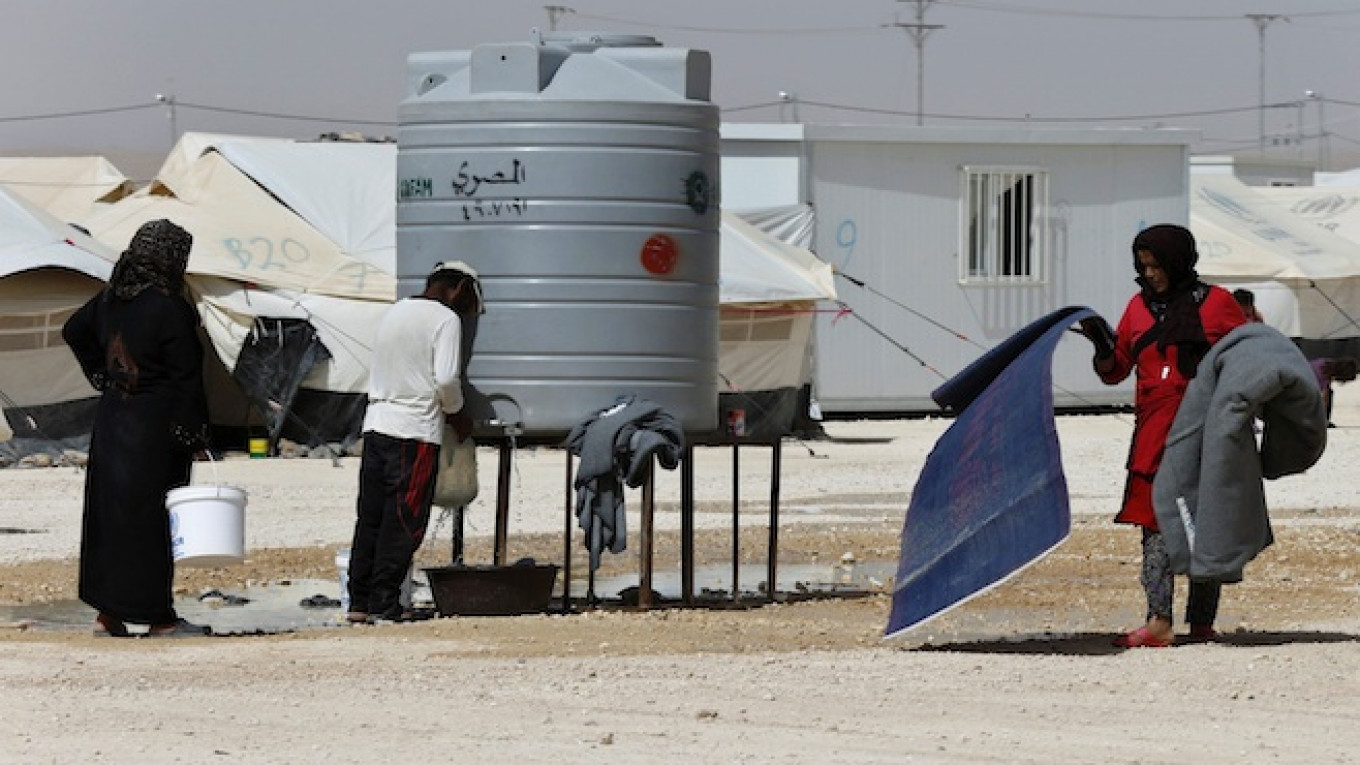With nearly 11 million Syrians in need of humanitarian help, UN Security Council members are pushing Russia and China to support a compromise draft resolution to boost cross-border access and threaten sanctions on those that stand in the way.
After more than a month of negotiations, during which Islamist fighters have taken swathes of Iraq and Syria, the June 27 draft tries to win over Moscow and Beijing with language similar to that used in a unanimously adopted resolution on Syria's chemical weapons.
It does not reference Chapter 7 of the UN charter, which covers the council's authority to enforce decisions with economic sanctions or military force, though the language is the same as what would normally be in a Chapter 7 resolution.
Russia says it would veto a Chapter 7 resolution that would allow cross-border aid deliveries without Syrian government consent. In a letter to the Security Council last month, Syria warned that such deliveries would amount to an attack, suggesting it would have the right to retaliate.
Russia, supported by China, has already vetoed four resolutions threatening any action against its ally, Syrian President Bashar Assad, amid a 3-year civil war that has killed at least 150,000 people.
Russian Deputy UN Ambassador Alexander Pankin declined to comment on whether Moscow would support the compromise draft.
Australia, Luxembourg and Jordan drafted the stronger text as a follow-up to their unanimously adopted February resolution that demanded rapid, safe and unhindered aid access in Syria, but has failed to make a difference.
The three countries are continuing negotiations with Russia and China on the draft resolution this week.
The draft says the council is "deeply disturbed by the continued, arbitrary and unjustified withholding of consent to relief operations and the persistence of conditions that impede the delivery of humanitarian supplies to destinations within Syria, in particular to besieged and hard-to-reach areas."
The United Nations says some 10.8 million people in Syria need help, of which 4.7 million are in hard-to-reach areas, while another 3 million have fled the conflict.
The draft resolution "decides that the United Nations humanitarian agencies and their implementing partners are authorized to use any and all routes, including across conflict lines and across borders, in particular the border crossings of Bab al-Salam, Bab al-Hawa, Al Yarubiyah and Tal Shihab, in order to ensure that humanitarian assistance, including medical and surgical supplies, reaches people in need throughout Syria."
Al Yarubiyah is on the border with Iraq and Tal Shihab is on the border with Jordan. Bab al-Salam and Bab al-Hawa cross into Turkey and have fallen into the hands of Islamist fighters.
Russia said last month that the Syrian government agreed to open the four crossings named in the draft, but Australian UN Ambassador Gary Quinlan said that plan was "not good enough" because the Syrian government wanted to impose restrictive conditions on the UN humanitarian operations.
The draft resolution "decides to establish a monitoring mechanism, under the authority of the United Nations Secretary-General, to monitor, with the consent of the relevant neighboring countries of Syria, the loading of all humanitarian relief consignments" to be delivered across those four points.
It "also decides that all Syrian parties to the conflict shall enable the immediate and unhindered delivery of humanitarian assistance directly to people throughout Syria" and "decides in the event non-compliance … by any Syrian party to impose measures directed against that party."
This would mean that for any action to be taken on non-compliance, such as imposing sanctions, the 15-member Security Council would need to agree on a second resolution.
UN aid chief Valerie Amos last week appealed to the Security Council to take action on the "inhuman" obstruction of humanitarian relief. Syrian UN Ambassador Bashar Ja'afari described the UN estimate of people in need as "exaggerated."
See also:
Australia's UN Envoy Criticizes Russian Plans to Boost Syria Aid
A Message from The Moscow Times:
Dear readers,
We are facing unprecedented challenges. Russia's Prosecutor General's Office has designated The Moscow Times as an "undesirable" organization, criminalizing our work and putting our staff at risk of prosecution. This follows our earlier unjust labeling as a "foreign agent."
These actions are direct attempts to silence independent journalism in Russia. The authorities claim our work "discredits the decisions of the Russian leadership." We see things differently: we strive to provide accurate, unbiased reporting on Russia.
We, the journalists of The Moscow Times, refuse to be silenced. But to continue our work, we need your help.
Your support, no matter how small, makes a world of difference. If you can, please support us monthly starting from just $2. It's quick to set up, and every contribution makes a significant impact.
By supporting The Moscow Times, you're defending open, independent journalism in the face of repression. Thank you for standing with us.
Remind me later.






